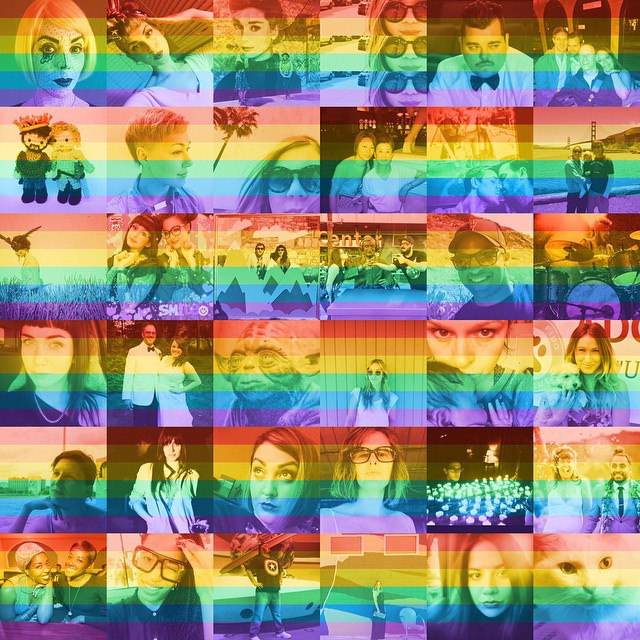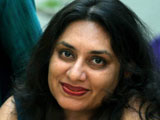Pakistan Reacts to the US Gay Marriage Ruling
by Bina Shah / July 10, 2015 / No comments

Facebook's Celebrate Pride rainbow filter. Photo via Flickr user Joe Chang.
The decision of the United States’ Supreme Court to legalize gay marriage has provoked an interesting reaction in Pakistan, which is probably being replicated in other countries across the Middle and Near East where gay rights are a yet unrealized dream for the many homosexuals who live in a forced closet because of social and religious norms. In Pakistan, transgendered people are legally recognized by the government, but gay marriage will most likely never make it to the law books in this conservative Muslim country.

- Pakistan is a country of contradictions – full of promise for growth, modernity and progress, yet shrouded by political, social and cultural issues that undermine its quest for identity and integrity. My bi-monthly column “Pakistan Unveiled” presents stories that showcase the Pakistani struggle for freedom of expression, an end to censorship, and a more open and balanced society.

- Bina Shah is a Karachi-based journalist and fiction writer and has taught writing at the university level. She is the author of four novels and two collections of short stories. She is a columnist for two major English-language newspapers in Pakistan, The Dawn and The Express Tribune, and she has contributed to international newspapers including The Independent, The Guardian, and The International Herald Tribune. She is an alumnus of the International Writers Workshop (IWP 2011).
Facebook celebrated the ruling with an option for users to layer their profile photos with the rainbow colors of the gay pride flag. With many people using this option, news of the legalization of gay marriage in the US is unavoidable. Parents cannot shield their children from this information either, short of the government blocking the entire Internet (and I don’t want to give them any ideas).
Seemingly overnight, all of Facebook turned rainbow-colored. Many of those rainbow colored Facebook profile pics showed up in Pakistani timelines, causing diverse reactions. On social media, some Pakistanis hailed the decision, and then there was a predictable backlash, with others posting that homosexuality is a crime against Islam, humanity, morality and nature. The reactions ranged from unequivocal support to cautious “live and let live” messages to outright rejection of the ruling.
It’s strange to think that a decision taking place in a country thousands of miles away should be of such interest to Pakistanis, especially when you consider that similar decisions in the United Kingdom, much of Europe, and Brazil evoked no similar reaction, supportive or otherwise. But then again, this is the age of social media and instant connectedness, where countries and their people are linked across continents and time zones.
When gay marriage was legalized in other countries, it wasn’t as publicized and Facebook made no mention of it. This time around, the reaction on Facebook has been so widespread that it’s impossible for Pakistanis not to take notice. Some Pakistanis on Facebook are also westernized or have spent considerable amounts of time in Western countries, while some are residing in the United States and want to show their support for their gay friends.
A humorous post on Twitter described the social awkwardness of youngsters having to explain to their parents or other elders just what the rainbow colors meant. A marginally popular actor, Hamza Ali Abbasi, used his public page to post disapproving messages about gay marriage, and thousands of comments supporting his stance appeared overnight. He wrote a series of unhappy posts telling everyone that he strongly disapproved of gay marriage. The worst thing, he said, was that his 12-year-old nephew asked what being gay meant and what gay marriage was. Some Facebook users tried to report his page for hate speech but were told it didn’t violate community standards. Other more creative ones took his profile photo and ran it through the FB Celebrate Pride rainbow color generator.
While supporters of gay rights in Pakistan are in a minority—and people who are gay in Pakistan remained overwhelmingly silent on Facebook for obvious reasons—there is some understanding and tolerance for gay people, if not for a full-fledged Western style LGBT movement. This is not to say that Pakistan is ready for gay pride marches. Western foreign missions whose foreign policy includes supporting sexual minorities also provide some discreet support to the understandably secretive LGBT community. They cannot do this openly, though; a few years ago the US Embassy held an event for LGBT people and when word got out of the event, religious parties protested vociferously, though, thankfully, not violently.
A cousin of mine who lives in the United States says, “In America, we have no way of knowing about the reaction in the rest of the world.” And yet, you need go no further than the timelines of people outside of America, on both Facebook and Twitter, to see the world’s reaction, including our own.
Vociferous as it is, it shows that Pakistanis are being exposed, via social media, to viewpoints, social systems, and ways of life vastly different from what they’re used to. It’s unthinkable, in Pakistan, to envision the government making gay marriage legal, but now there’s no way to be an ostrich about the fact that it exists in other societies. This is uncomfortable for most Pakistanis, yet is necessary in making us realize that other people don’t see the world in the same way as we do. In a sense, it’s a learning experience in diversity and tolerance for a population that is fairly shielded from the acceptance of either.




